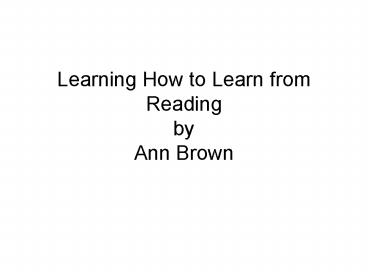Learning How to Learn from Reading by Ann Brown - PowerPoint PPT Presentation
1 / 23
Title:
Learning How to Learn from Reading by Ann Brown
Description:
reread rather than underline, take notes, or outline. don't employ self-interrogation ... Helping Students Learn How To Learn. Awareness of: ... – PowerPoint PPT presentation
Number of Views:32
Avg rating:3.0/5.0
Title: Learning How to Learn from Reading by Ann Brown
1
Learning How to Learn from ReadingbyAnn Brown
2
Overview
- Describe comprehension and monitoring skills
- Trace difficulties young and poorer students have
in employing these tactics - Indicate how successful students develop more
effective learning techniques - Discuss methods to help students who fail to
develop necessary skills
3
Two forms of metacognition
- 1. knowledge about the learning situation
- knowledge about capabilities
- ability to reflect on cognitive processes
awareness - A late developing skill
4
Two forms of metacognition
- 2. self-regulatory mechanisms
- relating current activity to past
- means-end analysis to identify effective
strategies - checking outcome of attempts to solve problem
- planning next move
- monitoring effectiveness of action
- testing, revising, and evaluating ones
strategies
5
Metacognitive skills of effective readers
- clarifying purpose of reading
- identifying important aspects of the message
- focusing on major content rather than trivial
6
Metacognitive skills of effective readers
- monitoring comprehension
- 4. engaging in self-questioning
- 5. taking corrective action when comprehension
fails
7
Types of difficulty common for novice readers
- lack of awareness of need to make sense of text
- unaware of deliberate reading strategies
- tolerate inconsistencies
8
Types of difficulty common for novice readers
- less likely to deal with semantic and syntactic
anomalies - do not adjust reading strategy according to
purpose - dont engage in study strategies
- reread rather than underline, take notes, or
outline - dont employ self-interrogation
9
Self-interrogation
- generating questions about important points in
the text - More effective than rereading
- More effective for lower-ability learners
- Implication?
- incorporates many metacognitive components
- Which ones?
10
Differences in self-awareness
- proficient readers
- activities no longer totally conscious
- deliberate action only when comprehension fails
- Impasse?
- novice readers
- tend not to engage in spontaneous monitoring
- can be helped by being made aware of simple
strategies
11
Development of self-regulation
- children develop learning skills without formal
training - less common for those of a disadvantaged
background - The difference suggested
- deficient mediated learning
12
?????? --
13
Vygotskys concept of internalization
- develop of cognitive control is a social process
- learner must gradually internalize the modeled
activities to develop skills of self-regulation
14
Vygotskys concept of internalization
- adult controls and guides childs activity
- gradually both share problem solving functions
- child takes initiative and adult corrects
- adult cedes control and acts as supportive
audience
15
Zone of Proximal Development
- "...the zone of proximal development... is the
distance between the actual development level as
determined by independent problem solving and the
level of potential development as determined
through problem solving under adult guidance or
collaboration with more capable peers." - (from Mind in Society)
16
Fuersteins theory
- cognitive growth depends on the quality of
mediated learning experienced by the child - (or, the human organism)
- disadvantaged students poor academic performance
due to lack of such experiences
17
School culture
- Students with mediated learning backgrounds
better prepared for similar school culture - For example, reading group disparities
18
Helping Students Learn How To Learn
- Awareness of
- available options to improve their own
performance - significant factors to take into account when
planning for learning
19
Four variables of the learning situation
- the nature of the material to be learned
- the criterial task for which the learner is
preparing - general characteristics of learners
- activities engaged in by learners
20
Cognitive Training with Awareness
- reaction to executing strategies without
understanding - literature suggests using underlining and
notetaking strategies is ineffective - Major design flaw?
21
Cognitive Training with Awareness (continued)
- comparison of spontaneous users and forced users
- Disparity in understanding end result
- spontaneous users of underlining marked important
info - forced users marked more randomly
22
Cognitive Training with Awareness
- Instruction on
- the skills
- how and why the skills are effective
- skill use not an end in themselves
- A means to a greater end
- based on goal of specific activity
23
Implications for Metacognition and Technology
- Class discussion
- Research
- Readers
- Writers































